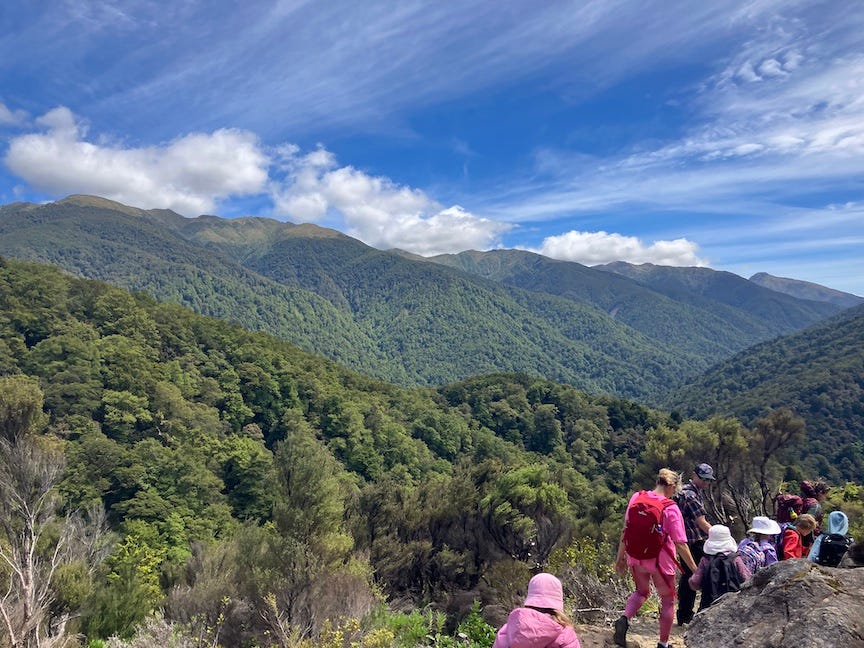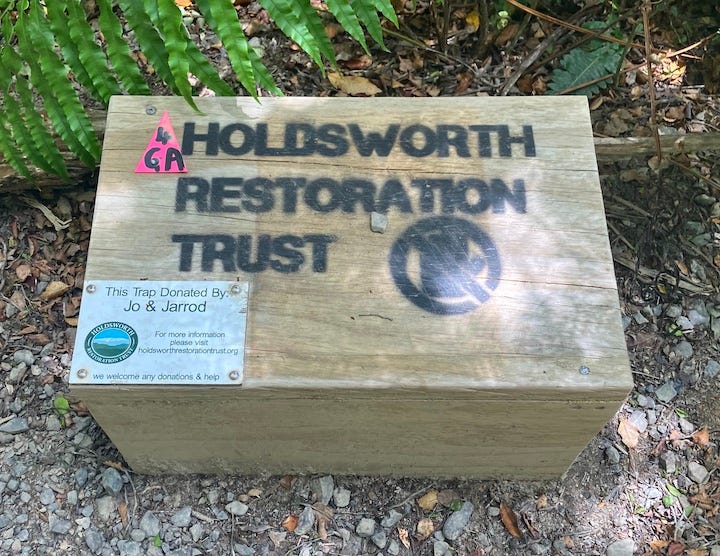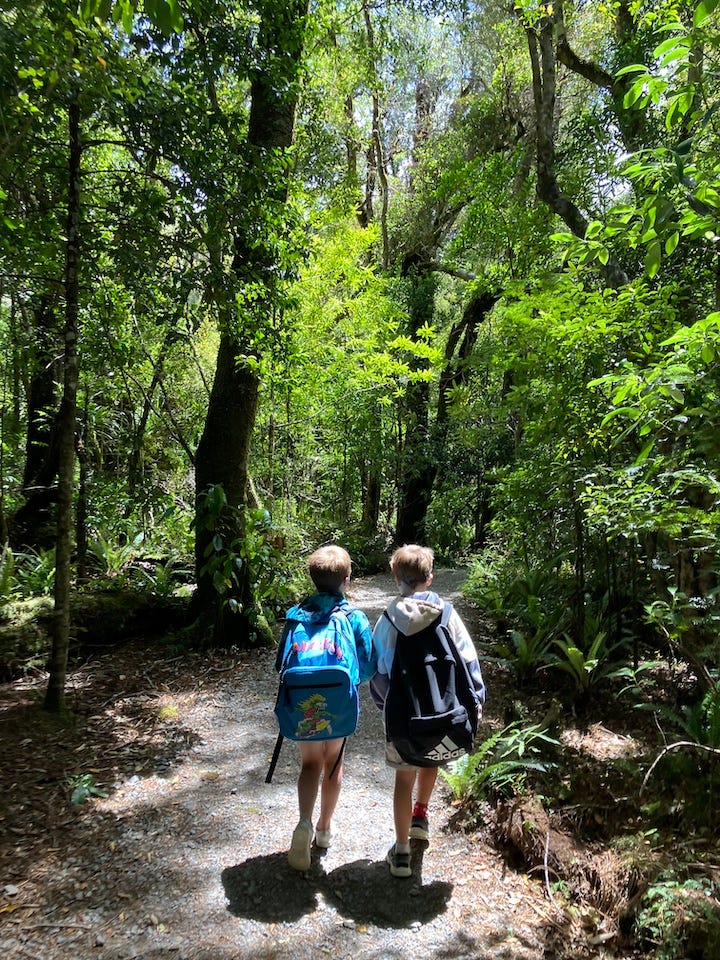A Walk is Not a Lesson
On the Mt. Holdsworth Track at the end of Year Four
At the Mount Holdsworth trailhead we circle the teacher. The eight-year-olds were to divide into two groups, by their own choice. One group would tramp an hour uphill to Rocky Lookout, which is rocky and has a great view. The other would walk twenty minutes up the valley to Donnelly Flat, which is flat. Does anyone know why they call it Donnelly Flat? We did not. Many years ago, the teacher said, a man named Donnelly lived there. He would hike to town to buy his supplies. One day he didn’t come out. “A year later they found his remains.”
Here endeth the lesson. There was no worksheet of trees to name or conservation principles to recite, just a walk in the mountains to close out Year Four (Americans: 3rd Grade.) Rocky Lookout got more takers. Ambition beat out the hunt for a ghost. The two groups set out together up the first km of the track, wide and graveled and guarded by pest traps bearing their donors’ names. Bless you, Jo and Jarrod, for killing the rats! We parents chatted as we walked. How the kids have grown! Plans for the holidays? Walk on and greater mysteries bubble up. You can tell a stranger anything with your eyes on the ground. “The forest is too quiet,” one mother said. “No birds.”
I was stunned. I will testify here that a bird sang even as she spoke, one of those anonymous blackbirds I should look up already. But Kiwis keep high standards for avian life. We’ve walked our kids at Holdsworth for years now and I’d never noticed the absence, or accumulated enough memories to measure against. Now all I could hear was the wind in the trees.
But there was work to do. The kids needed mustering, a hand held, a shoelace tied. The track rose and the gravel faded out. The clay beneath was the innocent gold of newborn poop. I forget everything of those years but the colors. We took a water break. The adults sipped. Kids drank like dogs or horses, with clear intent and a big sigh after.
On we climbed. The tree roots made stairs. Sometimes there were actual stairs, wooden boxes topped with gravel, with less official paths worn around them in the illusion of choice. There’s a shelf you get to halfway up, a long level switchback curling north along the side of the hill. The silver ferns bow overhead like props in a dinosaur movie. Tiny bridges cross the seams where the rain runs when we’re not there. The dirt turned black, and we picked through a long patch of sticky mud. “This was from the other night,” the teacher said as we squelched through. “Monday, was it?” I remember Monday. A dry night in the valley but on the morning drive to school the rivers were churning. The Tararuas hold weather here we are not always privileged to know.
The kids with digital watches announced we’d been walking for an hour. Above the shelf the track turned chalky white. It’d been a few years but this layer I remember: a desert rat twitches for anything alkali. The teacher, though, was watching the plants. “You see the manuka,” she said, “you know you’re almost there.” Manuka to me is a three-hundred-dollar jar of honey in a Shanghai import store. On the Mt. Holdsworth Track it’s revealed to be a skinny bush with waxy green leaves, the closest NZ gets to creosote. Good on ya, manuka.
Final stretch, now. A boy next to me drags his white sneakers over the rocks. “How much longer?” Walk with your body, I tell him. Put your mind anywhere else. “I play hockey,” he says. “There’s practice tonight.” That’s the ticket. “How much longer now?”
One last corner, and then the sky opened and the kids hooted in victory and bolted the last few yards to the lookout. There was a terrific wind up there, and a viewing platform and a hall-of-fame climbing boulder the kids promptly covered like ants on a peach. The sky was all mare’s tails and summer blue. The red roof of Powell Hut was clearly two thousand feet above us, the valley just past the car park a thousand feet below. In between, only the green mountains. Lunchboxes scattered. Windbreakers and ponytails flapped like flags. One blonde mullet danced like the tail of a phoenix. We parents scurried about, ordering jackets on. In mountain weather bodily autonomy goes out the window. I cornered my boy and draped a University of Texas hoodie over him like that guy who used to put the cape on James Brown. There were snacks, but still no lessons. Anyways the wind would carry anything not shouted. Atop the boulder my son pulled a Titanic and I wondered if the wind would take him. Little gods up there, they were. A hard squint into the weather makes any face an adult. We posed for a photo, said goodbye to the sky, and broke once more for the shelter of the manuka.
Downhill all had changed. Maybe the lesson was the walk, and in descent the lesson was done? Gravity brought us home. Down past the chalky rock, around the shelf of ferns and bridges, and down again over the newborn gold. Kids slipped and sat and made rocketship sounds. They could walk and talk, too. One girl, to her friends: “Raise your hand if you’ve been in a swimming competition.” One boy, to the trees: “THIS IS GOING TO TAKE A WEEK.” Others climbed anything they could, a parkour of the woods. From a stump beside the path: “I’m going to climb the highest mountain in the world: Mount Stump!” This started a riff. “I’m going to climb to the lowest mountain in the world. Mount Ground!”
Behind the climbers, a second mother noted the silence of the forest. This was not news. This was an old burden. “Been quiet for years,” she said wearily. “You’ll have more wildlife in town.” I redoubled my search. A bird-shaped shadow crossed my path but I lost it in the canopy. But it’s true—I heard no tūī wolf-whistles, no bomber flap of a kererū. Something had been lost. Back at the trailhead over our picnic lunch I would hear again the story of how once you couldn’t even sleep in a boat offshore, the birds were so loud. Eden it was, before the Europeans. Before the Māori, even. “Shame about the Moa,” someone said. Like ostriches they were, but bigger and beefier, and hunted to extinction before Columbus was born. New Zealand still grieves.
Out on the trail, though, we got through the loss a-walkin’. You find a happy tired that’s not tired at all. I taught in universities for years. At certain checkpoints you sat down and wrote a Teaching Philosophy, two or three single-spaced pages naming your values sought and plans to get there. Little sermons, they were, and I believed every word. But I have walked away now. Some days it seems the world has too. A walk is not a lesson. A body moves through mountains. A mind goes silent in the trees.
We stopped at the fork to wait for the others. Team Donnelly Flat was taking their time. Perhaps they’d met their namesake’s fate? There was no cell signal to check. The kids dropped their packs and passed the time. A game of charades broke out. A tall boy strutted back and forth bobbing his head: “Kiwi!”
The next did a nice volcano, but this was disallowed. Nature day, the kids argued. Animals only. The boy shrugged and flapped his arms. “Tūī!”
Then the next boy took his turn, younger than the rest. He stepped nervously out on the trail, and held still for a long moment, shy or still choosing his beast.
“Human!”
The boy shook his head, and flapped his arms. //






I love this Dan, thanks for sharing your musings! I particularly like when you talk about there not being a lesson; that the kids were simply walking. It reminds me of my primary school days simply being in nature. I read somewhere that we are not human-strivings but are human-BEings, we can just be.
To learn to appreciate the natural world children should come to their own understanding and friendship with it before we try and force facts and figures into them. I think maybe that’s why kiwis are so protective over the land, because they learnt to love it as a friend rather than a fact sheet.
Once again, this piece was amazing, thank you 😊
Can't beat just soaking up life by being in nature. The birdlife in the Tararuas is low. HRT Holdsworth Restoration Trust is always keen for volunteers as the multi year project to trap rats, stoats etc continues. Once every few months vollies replenish traps. Every six months a monitor is done of what pests are around. It's easy conservation work, and is making an audible difference to the bush. Poster's by the track gate at Holdsworth if you want more info.